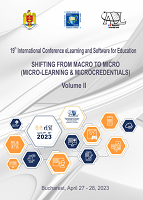‘THEY DON’T ALWAYS TELL ME WHAT I NEED TO HEAR’. AN EXPLORATORY ANALYSIS AND COMPARISON OF EXPECTED VS. PERCEIVED TEACHER-PROVIDED ACADEMIC FEEDBACK
‘THEY DON’T ALWAYS TELL ME WHAT I NEED TO HEAR’. AN EXPLORATORY ANALYSIS AND COMPARISON OF EXPECTED VS. PERCEIVED TEACHER-PROVIDED ACADEMIC FEEDBACK
Author(s): Dorin Stanciu, Liliana CiascaiSubject(s): Education, School education, Sociology of Education, Pedagogy
Published by: Carol I National Defence University Publishing House
Keywords: teacher/instructor-provided feedback; higher/tertiary education; scale development; exploratory analyses;
Summary/Abstract: While the importance of feedback is readily accepted and acknowledged by teachers and researchers alike, challenges like what feedback is, how to measure it, and what about it matters are far from being satisfactorily addressed. Moreover, even though the literature includes a vast volume of studies about academic feedback, there are very few instruments that provide validated procedures (i.e, questionnaires, scales, inventories, etc.) and thorough analyses on how to measure it. Against this backdrop, we designed and build a dual scale capable of investigating both the perceptions of the students regarding the actual feedback and their expectations about the same aspects of the feedback. The questionnaires were 7-step Likert-type scales, which included 24 items each, and elicited agreement-vs-disagreement responses regarding several aspects pertaining to how students perceive their teacher feedback and how they expect the feedback to be. The participants' sample consisted of graduate and masters university students and included a number of = 716 ( = 20.67, = 2.23), of which = 355 were women ( = 20.39, = 1.31). Our findings indicate there are significant differences between what students perceive as being provided with, what they think feedback should include, be characterized of, and how it should be provided. These results are neither surprising, nor absolutely new, as several other studies pointed out that such differences can manifest, and can be attributed to how people (i.e., students) conceptualize and reconcile the differences between expected/desired and actually provided. Nevertheless, to our knowledge, this is the first time a research built a paired, one-to-one comparison of expected feedback versus perceived as being the actually provided feedback.
Journal: Conference proceedings of »eLearning and Software for Education« (eLSE)
- Issue Year: 19/2023
- Issue No: 02
- Page Range: 294-307
- Page Count: 14
- Language: English

